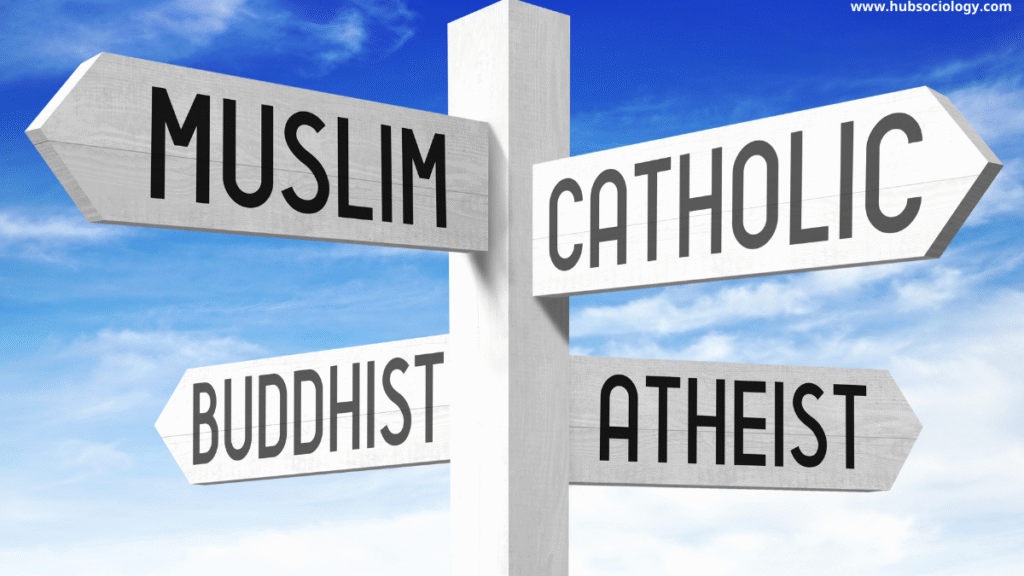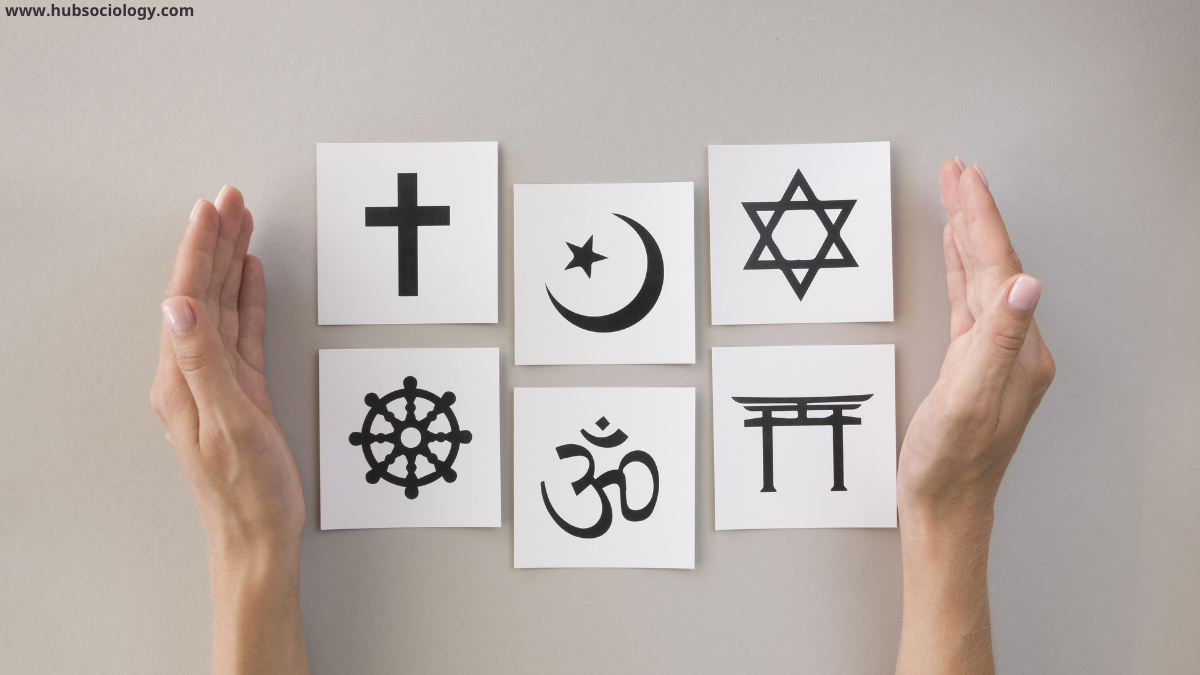Introduction on Sociology of Religion
Religion has always been one of the most significant institutions in human civilization, shaping moral codes, cultural values, and collective identities. Yet, in the contemporary era marked by rationalization, globalization, and secularization, religion faces new challenges and transformations. The sociology of religion studies this dynamic relationship between faith and society — how religion both influences and is influenced by social structures, human behavior, and historical changes.
In a world increasingly described as “secular,” the persistence and adaptation of religion raise key sociological questions: How does faith survive in modern societies dominated by science and technology? Why does religion still play a powerful role in politics and identity, even in supposedly secular nations? What new forms of spirituality emerge in a globalized, individualistic culture?
This article explores Sociology of Religion through a sociological lens — tracing the evolution of religion in human society, examining classical and contemporary theories, and understanding how faith continues to find meaning in a secular world.

Table of Contents
1. Understanding the Sociology of Religion
The sociology of religion is a subfield of sociology that examines religious beliefs, practices, organizations, and their relationship with social life. Unlike theology, which deals with divine truth or spiritual doctrine, sociology of religion studies religion as a social phenomenon — created, maintained, and transformed by human interactions.
Key sociologists such as Émile Durkheim, Max Weber, and Karl Marx laid the foundation for this field. They explored how religion contributes to social solidarity, social control, and moral order, but also how it can reinforce inequality or catalyze social change.
In modern sociology, religion is not only seen as an organized belief system but also as a cultural framework that provides meaning, identity, and belonging. It becomes a way to interpret the world, to cope with uncertainty, and to find purpose in life — even as secular ideologies challenge its dominance.
2. Historical Context: Religion and Society
Historically, religion has been intertwined with all aspects of human life — governance, economy, education, and family. In ancient societies, religion legitimized kingship and political authority. In medieval Europe, the Church wielded immense power over both spiritual and temporal affairs. In South Asia, the caste system and dharmic codes structured society along religious lines.
However, the Enlightenment and the Scientific Revolution in the 17th and 18th centuries challenged religious orthodoxy. Thinkers such as Voltaire, Kant, and Comte emphasized reason over faith. Auguste Comte, the founder of sociology, predicted that human knowledge would evolve from theological to metaphysical to scientific stages — a process known as the law of three stages.
Despite this, religion never disappeared. Instead, it adapted. The modern world has witnessed religious reformations, interfaith movements, and new spiritualities that coexist with secular institutions. Thus, the sociology of religion studies not the “end” of religion, but its transformation in the face of modernization.
3. Classical Sociological Perspectives on Religion

a) Émile Durkheim: Religion as Social Cohesion
Durkheim viewed religion as a crucial source of social solidarity. In his book The Elementary Forms of Religious Life (1912), he studied Australian Aboriginal totemism and concluded that religious symbols represent the collective conscience — the shared values and beliefs of society.
For Durkheim, the sacred and the profane distinction is central: by defining what is sacred, society reaffirms its unity and moral order. Even in secular societies, rituals such as national holidays or public mourning function like religious ceremonies, binding people together. Thus, Durkheim saw religion as a mirror of society — when people worship God, they symbolically worship their own community.
b) Max Weber: Religion and Social Change
Weber’s approach differed from Durkheim’s functionalism. In The Protestant Ethic and the Spirit of Capitalism (1905), he argued that religion can be a driving force of social change. The Protestant ethic, especially Calvinist doctrines of hard work and discipline, helped shape modern capitalism in Western Europe.
Weber also compared world religions — Christianity, Hinduism, Buddhism, and Confucianism — to explain how religious values influence economic behavior and social structures. For Weber, religion is not only a social glue but also a motivator of human action, shaping cultural orientations and worldviews.
c) Karl Marx: Religion as Ideology and Alienation
Marx viewed religion from a conflict perspective. He famously described it as the “opium of the people,” a tool used by the ruling class to maintain control. Religion, according to Marx, provided false comfort to the oppressed, making them accept their suffering as divinely ordained.
Yet, Marx also acknowledged religion’s dual nature — it can justify domination but also inspire rebellion. Liberation theology in Latin America and various social movements worldwide show that religion can indeed become a force of resistance.
4. Modernization, Secularization, and the Changing Role of Religion
The secularization thesis dominated sociological thought for much of the 20th century. It argued that as societies modernize — through industrialization, urbanization, education, and scientific progress — religion would lose its social influence.
Indicators of secularization include:
- Declining church attendance and religious affiliation
- Reduced influence of religious institutions on politics and education
- Growing acceptance of rational-scientific worldviews
However, empirical evidence suggests that secularization is uneven and complex. While Western Europe has experienced significant decline in religious practice, the United States, Latin America, Africa, and parts of Asia have seen religious revivals and new spiritual movements.
Sociologists now speak of a “post-secular society”, where religion coexists with secular values. Faith may no longer dominate public institutions, but it remains vital in private life and identity formation.
5. Religion in a Globalized and Digital World
Globalization has created new patterns of religious interaction. Migration, communication technologies, and global networks have facilitated the spread of diverse faiths across borders. This has led to:
- Religious pluralism, where multiple religions coexist within a society.
- Interfaith dialogue, promoting mutual understanding and peace.
- Religious syncretism, blending beliefs and practices from different traditions.
The digital age has further transformed religion. Online prayer groups, virtual pilgrimages, and digital sermons have redefined the boundaries of faith communities. Social media platforms host both religious education and debate, allowing believers to connect beyond geographic limits.

Yet, the digitalization of religion also raises concerns — the spread of extremist ideologies, religious misinformation, and commercialization of faith.
6. Religion, Identity, and Social Conflict
Religion remains a powerful marker of collective identity. It shapes group boundaries, influencing who belongs and who does not. In multi-religious societies like India, Nigeria, or Israel, religious affiliation often overlaps with ethnicity, language, and political ideology, leading to both solidarity and conflict.
The rise of religious nationalism — such as Hindutva in India, Islamic revivalism in the Middle East, or Christian conservatism in the U.S. — shows how faith can be politicized to assert cultural dominance.
Sociologists study these phenomena not as purely theological disputes but as expressions of power relations, historical memory, and social anxiety in changing societies.
7. New Religious Movements and Spiritual Trends
As traditional religions face declining institutional authority, new forms of spirituality have emerged:
- New Religious Movements (NRMs): groups such as the Hare Krishna, Scientology, or Baháʼí Faith appeal to individuals seeking alternative spiritual paths.
- Neo-paganism and New Age movements: emphasizing nature, inner energy, and holistic well-being.
- Individualized spirituality: “believing without belonging,” where people maintain personal faith without institutional commitment.
These trends show that while institutional religion may decline, spirituality endures. Faith becomes more personalized, flexible, and global — reflecting postmodern values of choice and self-expression.
8. Religion and Social Change
Religion continues to influence global issues such as human rights, gender equality, and environmentalism. Faith-based organizations play active roles in education, health care, and humanitarian relief. Movements like eco-theology and interfaith environmental activism demonstrate how religious ethics adapt to new global challenges.
Furthermore, religion often serves as a moral resource during crises. The COVID-19 pandemic, for instance, revived discussions on faith, mortality, and community care. Despite physical isolation, religious institutions used technology to sustain belonging and hope.
9. Religion in a Secular Society: Coexistence or Conflict?
The relationship between religion and secularism is not necessarily oppositional. Many modern societies attempt to maintain “religious pluralism within secular governance.”
For example:
- In France, laïcité emphasizes strict separation of religion and state.
- In the United States, the First Amendment ensures freedom of and from religion.
- In India, secularism means equal respect for all religions, rather than exclusion from public life.
Sociologists highlight that the goal is not to eradicate religion but to ensure inclusive coexistence — allowing individuals to practice faith while respecting diversity and rational discourse.
10. The Future of Faith in a Secular World
As the 21st century unfolds, religion faces both decline and renewal. Key trends shaping the future include:
- Demographic shifts: Religious populations growing in Africa and Asia, while declining in Europe.
- Youth religiosity: Younger generations often redefine faith through social justice, environmental ethics, and digital spirituality.
- Interfaith cooperation: Global issues like climate change and migration encourage moral solidarity across religious lines.
- Artificial intelligence and transhumanism: raising new ethical and theological questions about human purpose and existence.
The sociology of religion thus remains vital — not only to understand faith but to comprehend the moral imagination of humanity in an age of change.
Conclusion on Sociology of Religion
Faith and secularism are not two opposing forces but intertwined aspects of modern life. While science and rationality explain the world, religion continues to give it meaning. In the secular world, religion evolves — becoming more individualized, pluralistic, and adaptive.
From Durkheim’s collective conscience to Weber’s ethic of transformation and Marx’s critique of ideology, the sociology of religion reveals that faith is never isolated from society. It reflects human needs for belonging, morality, and transcendence — needs that persist even in a technologically advanced, rational world.
Ultimately, studying the sociology of religion reminds us that secularism may shape institutions, but faith continues to shape hearts — guiding humanity through the complexities of modern existence.
Do you like this this Article ? You Can follow as on :-
Facebook – https://www.facebook.com/hubsociology
Whatsapp Channel – https://whatsapp.com/channel/0029Vb6D8vGKWEKpJpu5QP0O
Gmail – hubsociology@gmail.com
Topic-Related Questions on Sociology of Religion
5 Marks Questions on Sociology of Religion
- Define the sociology of religion.
- What is meant by secularization?
- State Durkheim’s view on the function of religion.
- What are new religious movements (NRMs)?
- What is meant by “believing without belonging”?
10 Marks Questions on Sociology of Religion
- Discuss the major sociological perspectives on religion.
- Explain Weber’s concept of the Protestant ethic and its impact on capitalism.
- Analyze the role of religion in identity formation and social conflict.
- Evaluate the secularization thesis with examples.
- Discuss the impact of globalization on religion.
15 Marks Questions on Sociology of Religion
- Examine how religion adapts and survives in a secular world.
- Compare and contrast the views of Durkheim, Weber, and Marx on religion.
- Discuss the relevance of religion in contemporary globalized society.
- Analyze the relationship between religion and social change in modern times.
- Evaluate the future of religion in a post-secular world.
